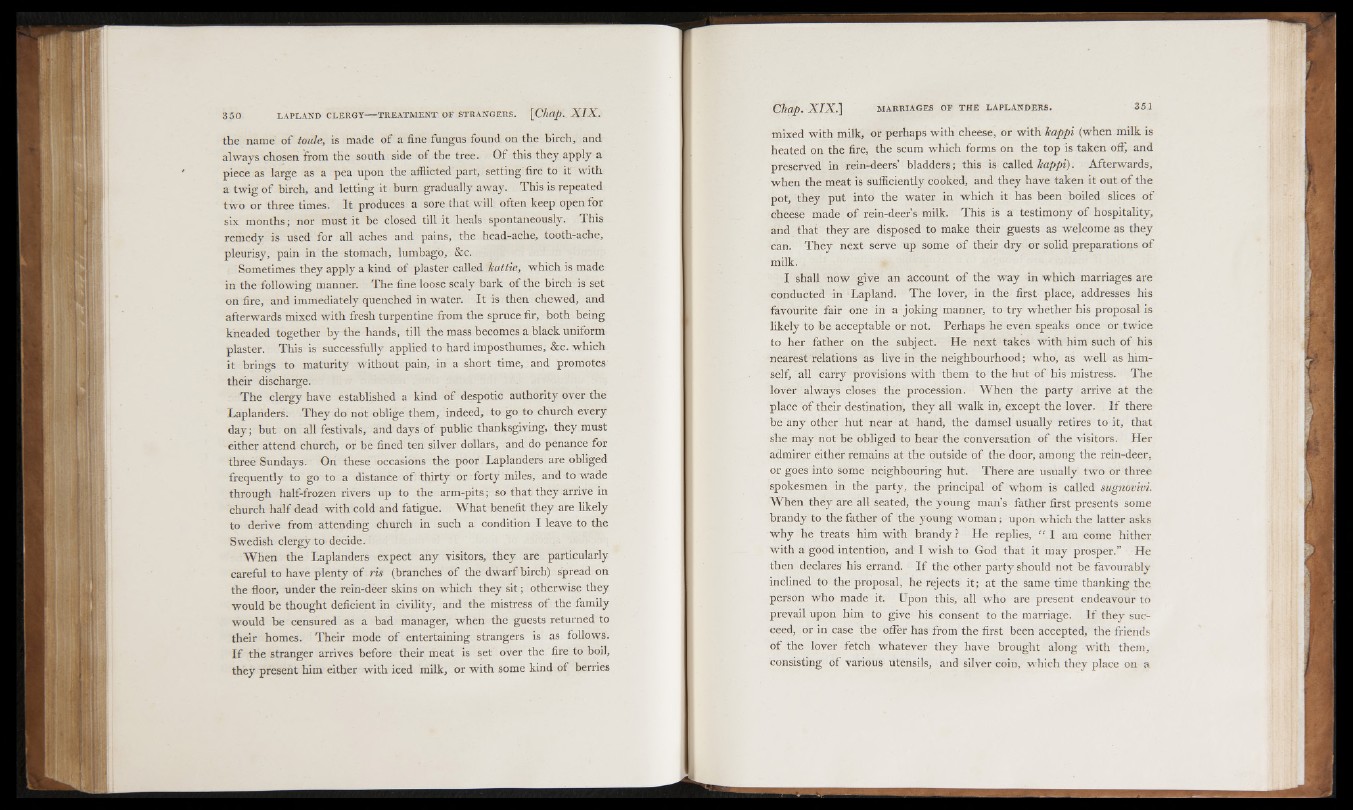
the name of toule, is made of a fine fungus found on the birch, and
always chosen from the south side of the tree. Of this they apply a
piece as large as a pea upon the afflicted part, setting fire to it with
a twig o f hirch, and letting it burn gradually away. This is repeated
two or three times. It produces a sore that will often keep open for
six months; nor must it be closed till it heals spontaneously. This
remedy is used for all aches and pains, the head-ache, tooth-ache,
pleurisy, pain in the stomach, lumbago, &c.
Sometimes they apply a kind of plaster called kattie, which is made
in the following manner. The fine loose scaly hark of the birch is set
on fire, and immediately quenched in water. It is then chewed, and
afterwards mixed with fresh turpentine from the spruce fir, both being
kneaded together by the hands, till the mass becomes a black uniform
plaster. This is successfully applied to hard imposthumes, &c. which
it brings to maturity without pain, in a short time, and promotes
their discharge.
The clergy have established a kind of despotic authority over the
Laplanders. They do not oblige them, indeed, to go to church every
day; but on all festivals, and days o f public thanksgiving, they must
either attend church, or be fined ten silver dollars, and do penance for
three Sundays. On these occasions the poor Laplanders are obliged
frequently to go to a distance of thirty or forty miles, and to wade
through half-frozen rivers up to the arm-pits; so that they arrive in
church half dead with cold and fatigue. What benefit they are likely
to derive from attending church in such a condition I leave to the
Swedish clergy to decide.
When the Laplanders expect any visitors, they are particularly
careful to have plenty of ris (branches of the dwarf birch) spread on
the floor, under the rein-deer skins on which they sit; otherwise they
would be thought deficient in civility, and the mistress of the family
would be censured as a bad manager, when the guests returned to
their homes. Their mode of entertaining strangers is as follows.
I f the stranger arrives before their meat is set over the fire to boil,
they present him either with iced milk, or with some kind of berries
mixed with milk, or perhaps with cheese, or with Jeappi (when milk is
heated on the fire, the scum which forms on the top is taken off, and
preserved in rein-deers’ bladders; this is called kappi). Afterwards,
when the meat is sufficiently cooked, and they have taken it out o f the
pot, they put into the water in which it has been boiled slices of
cheese made of rein-deer’s milk. This is a testimony o f hospitality,
and that they are disposed to make their guests as welcome as they
can. They next serve up some of their dry or solid preparations of
milk.
I shall now give an account of the way in which marriages are
conducted in Lapland. The lover, in the first place, addresses his
favourite fair one in a joking manner, to try whether his proposal is
likely to be acceptable or not. Perhaps he even speaks once or twice
to her father on the subject. He next takes with him such of his
nearest relations as live in the neighbourhood; who, as well as himself,
all carry provisions with them to the hut o f his mistress. The
lover always closes the procession. When the party arrive at the
place o f their destination, they all walk in, except the lover. I f there
be any other hut near at hand, the damsel usually retires to it, that
she may not be obliged to hear the conversation of the visitors. Her
admirer either remains at the outside o f the door; among the rein-deer,
or goes into some neighbouring hut. There are usually two or three
spokesmen in the party, the principal o f whom is called sugnovivi.
When they are all seated, the young man’s father first presents some
brandy to the father of the young woman; upon which the latter asks
why he treats him with brandy ? He replies, “ I am come hither
with a good intention, and I wish to God that it may prosper.” He
then declares his errand. I f the other party should not be favourably
inclined to the proposal, he rejects it; at the same time thanking the
person who made it. Upon this, all who are present endeavour to
prevail upon him to give his consent to the marriage. I f they succeed,
or in case the offer has from the first been accepted, the friends
of the lover fetch whatever they have brought along with them,
consisting of various utensils, and silver coin, which they place on a